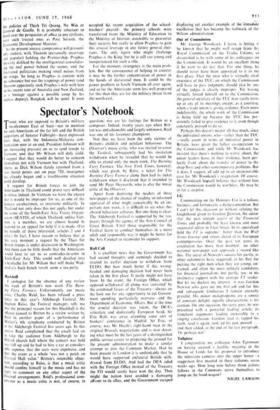Out of Commission
Mr. George Woodcock, I learn, is letting it be known that he might well resign from the Royal Commission on the Trades Unions, so dissatisfied is he with some of his colleagues on
the Commission. It would be an excellent thing if he were to do just that. For one thing, he should never have been appointed to it in the first place. That the man who is virtually chief executive of the TUC. on which the Commission will have to pass judgment, should also be one of the judges is clearly improper. Yet having virtually forced himself on to the Commission, the general secretary of the TUC now rarely turns up at any of its meetings, except, as a courtesy, when a trade union is giving evidence. Even more indefensibly, the whole work of the Commission is being held up because the TUC has per- sistently failed to give evidence to it, even though constantly pressed to do so.
Perhaps this doesn't matter all that much, since the individual unions, who—rather than the TUC —really count in terms of industrial power in Britain, have given the fullest co-operation to the Commission; and while Mr Woodcock has insisted that there's nothing to worry about, the union leaders have, in their evidence, been per- fectly frank about the transfer of power to the shop floor and other contemporary problems. But it does, I suggest, all add up to an unanswerable case for Mr.Woodcock's resignation. Of course, Mr Woodcock hispself believes that without him the Commission would be worthless. He may be in for a surprise.






























 Previous page
Previous page